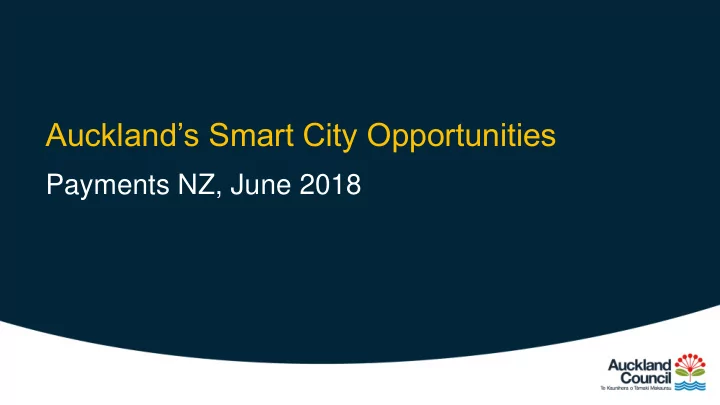

Auckland’s Smart City Opportunities Payments NZ, June 2018
What is a smart city? Citizen focused: • Citizens tend to consider a smart city as clean, friendly and has good transport connections. Other words they associate with smart cities (although less frequently) include “technology”, “connected”, “internet” and “modern”. • “A ‘smart city’ means ‘smart citizens’ – where citizens have all the information they need to make informed choices about their lifestyle, work and travel options”.
What is a smart city? Data-driven definitions: • IBM: “ one that makes optimal use of all the interconnected information available today to better understand and control its operations and optimize the use of limited resources ”. • Cisco: “ scalable solutions that take advantage of information and communications technology (ICT) to increase efficiencies, reduce costs, and enhance quality of life ”.
What is a smart city? Broad definitions: • UK Department for Business, Innovation and Skills (BIS): ‘ a process rather than a static outcome, in which increased citizen engagement, hard infrastructure, social capital and digital technologies make cities more liveable, resilient and better able to respond to challenges ’. • The British Standards Institute (BSI): “ the effective integration of physical, digital and human systems in the built environment to deliver sustainable, prosperous and inclusive future for its citizens ”. 67
Why is a smart city important to Auckland? Existing and future needs
Safe Swim
Integrated Transport Management
Holistic Urban Planning
What does a smart city mean to Auckland? And how do we find out?
What does a smart city mean to Auckland? Auckland Plan: For Auckland to be a world class city [the world’s most livable city] Smart City outcomes(?): To deliver the outcomes of the Auckland Plan: Homes & Places, Transport & Access, Opportunity & Prosperity, Environment and Cultural Heritage, Maori Identity & Wellbeing, Belonging & Participation
What is the Auckland’s smart city programme? Purpose: • To collectively define what a ‘smart city’ means to Auckland in order to identify projects, activities and initiatives that can co-deliver the desired outcomes in a cost effective way. Objectives: • To gain the city’s consensus, permission and to develop a roadmap for delivery • To provide clarity to the market in the smart city concept to allow businesses to target investment into appropriate and realistic opportunities • To identify and form new partnerships, business and delivery models that could be used to deliver projects and new ways of working
How will we find out? The Auckland Smart City Programme: • A 2 year programme of work to identify the potential benefits, risks and opportunities, written into a business case to gain funding from the next Long Term Plan cycle • A programme structure that provides a mechanism for collaboration, governance and management control by Auckland Council and its CCOs • A portfolio of projects to provide the necessary evidence for the business case development process (e.g proof of concepts and pilots primarily funded by the private sector and national government agencies)
How will we find out? The Auckland Smart City Programme: • A series of co-design workshops to engage the CCO family, academia and industry about technology, its potential usage and application • A set of approaches to hold dialogue with citizens and communities about what smart cities means to them, for example how it will support them in their daily lives and how to resolve issues of privacy, data and information sharing • A structured opportunity for local start-ups, businesses and individuals to benefit from the opportunities that the programme could provide
What are the potential opportunities? Enabling technologies bring new business models
Enabling technologies & processes Pre-requisites to deliver smart city outcomes: • Block chain/ open distributed ledgers: transparent, secure, interrogatable transactions • Whole life decision making: Connected data, big data, data sharing, data analytics, the cloud, high performance computing • Organisational structures and delivery models: ISO 55001, asset management, whole life value, outcome based mechanisms, integrated project delivery • Open Banking: automated service optimisation for consumers, drives the provision of effective solutions across the built environment
Water Quality & Flood Protection
Mobility as a Service
Logistics as a Service
A Smart Grid
A Circular Economy
Recommend
More recommend